Charles E W Bean, Diaries, AWM38 3DRL 606/246/1 - 1916 - 1929 - Part 2
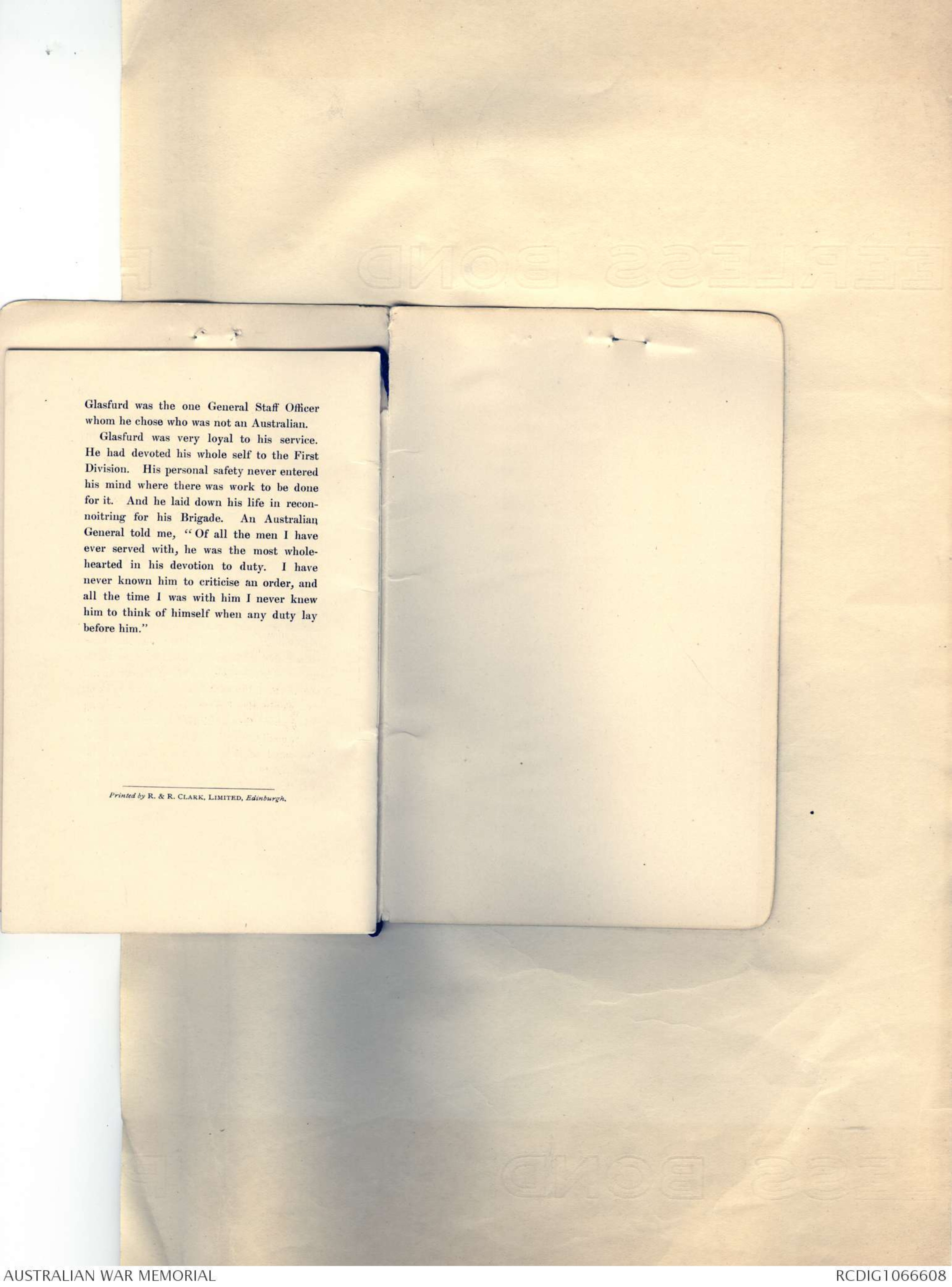
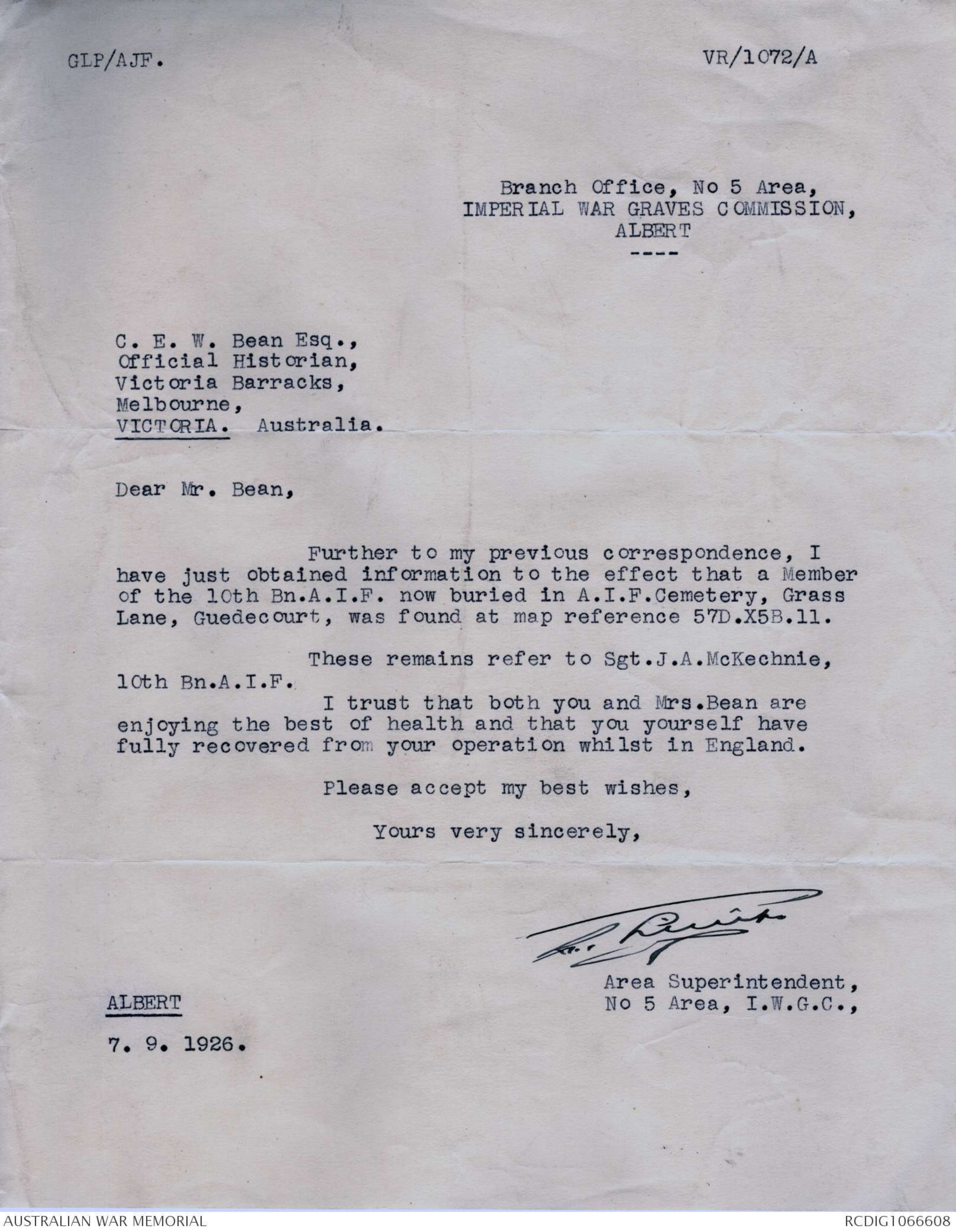
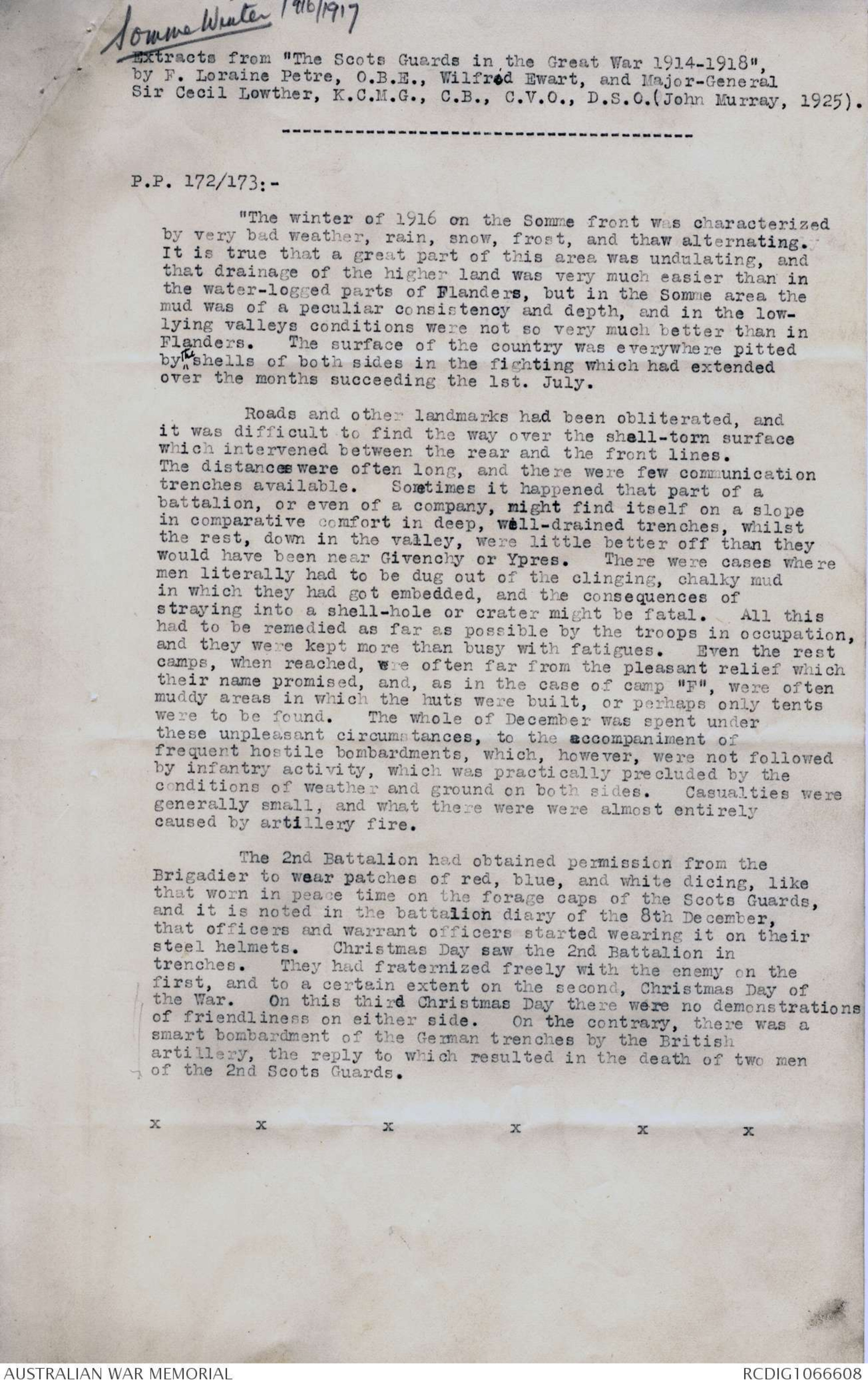
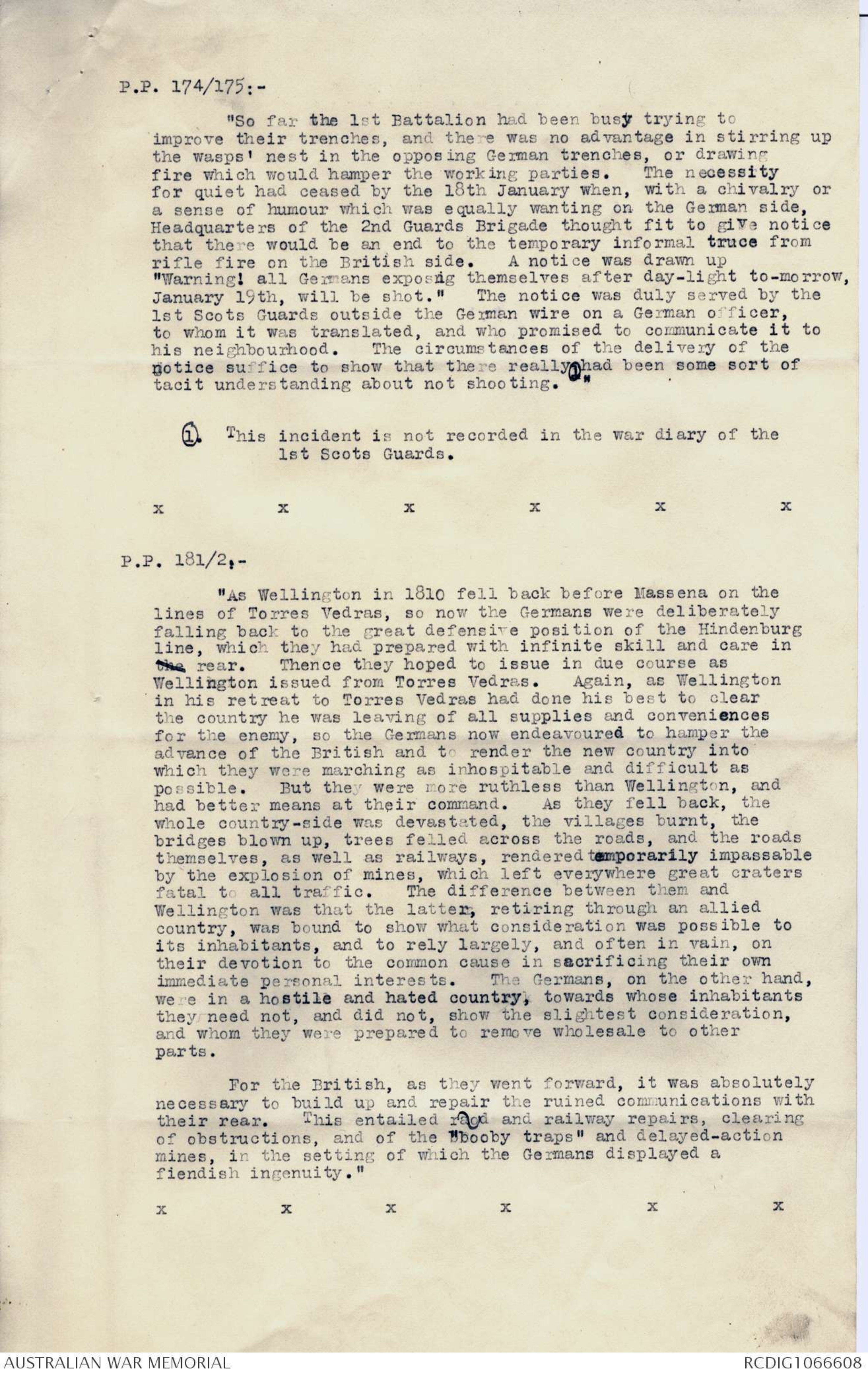
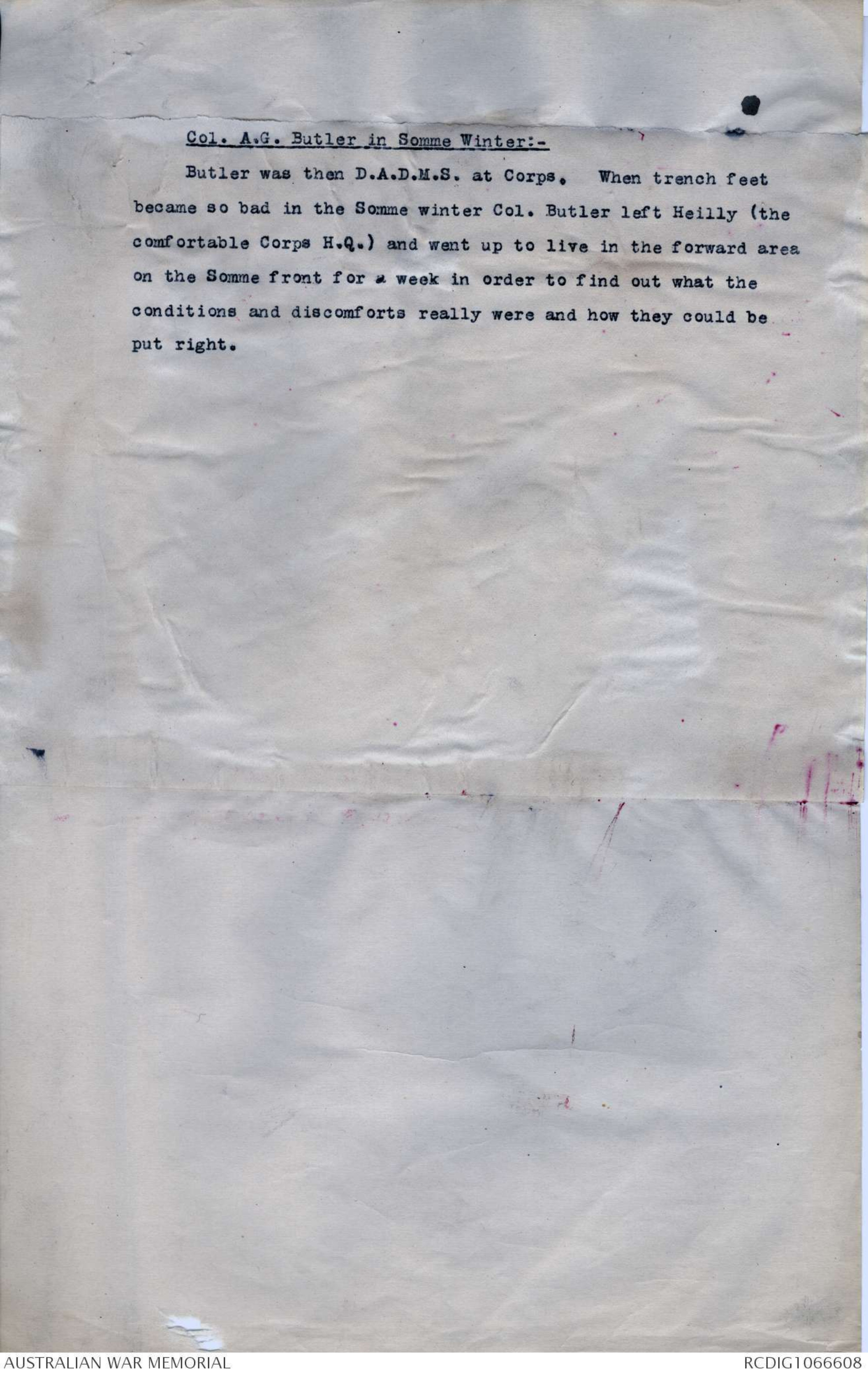
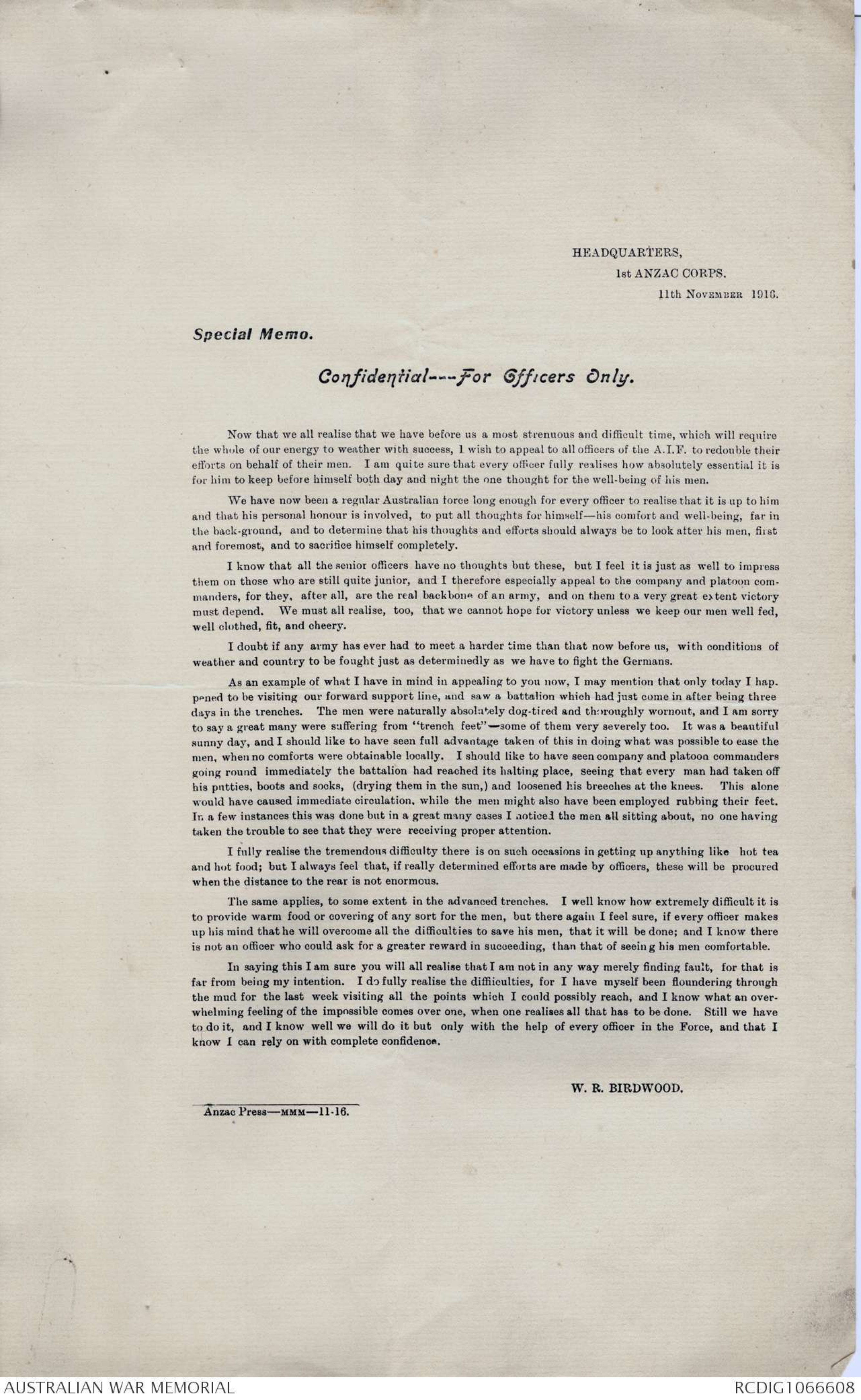
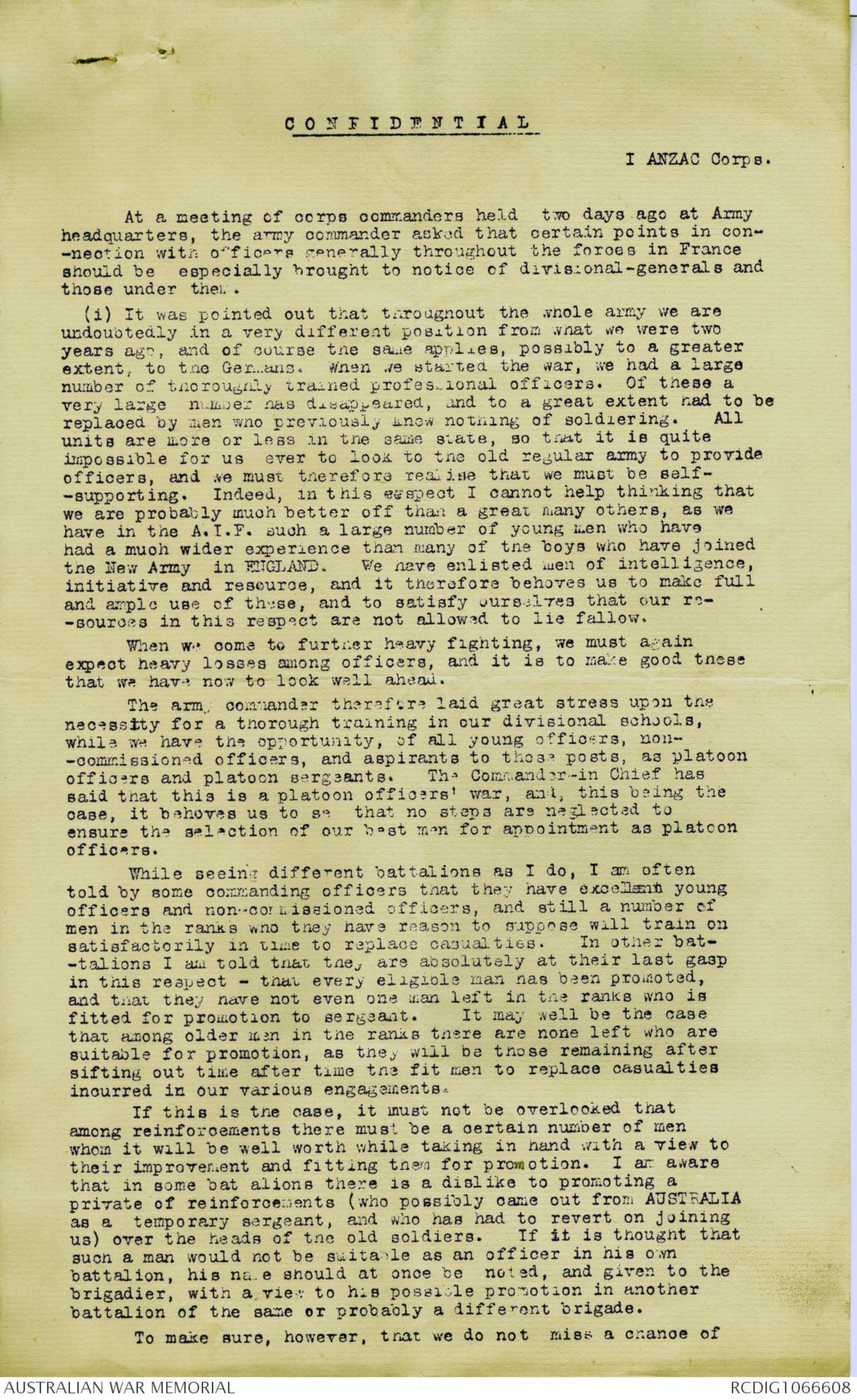
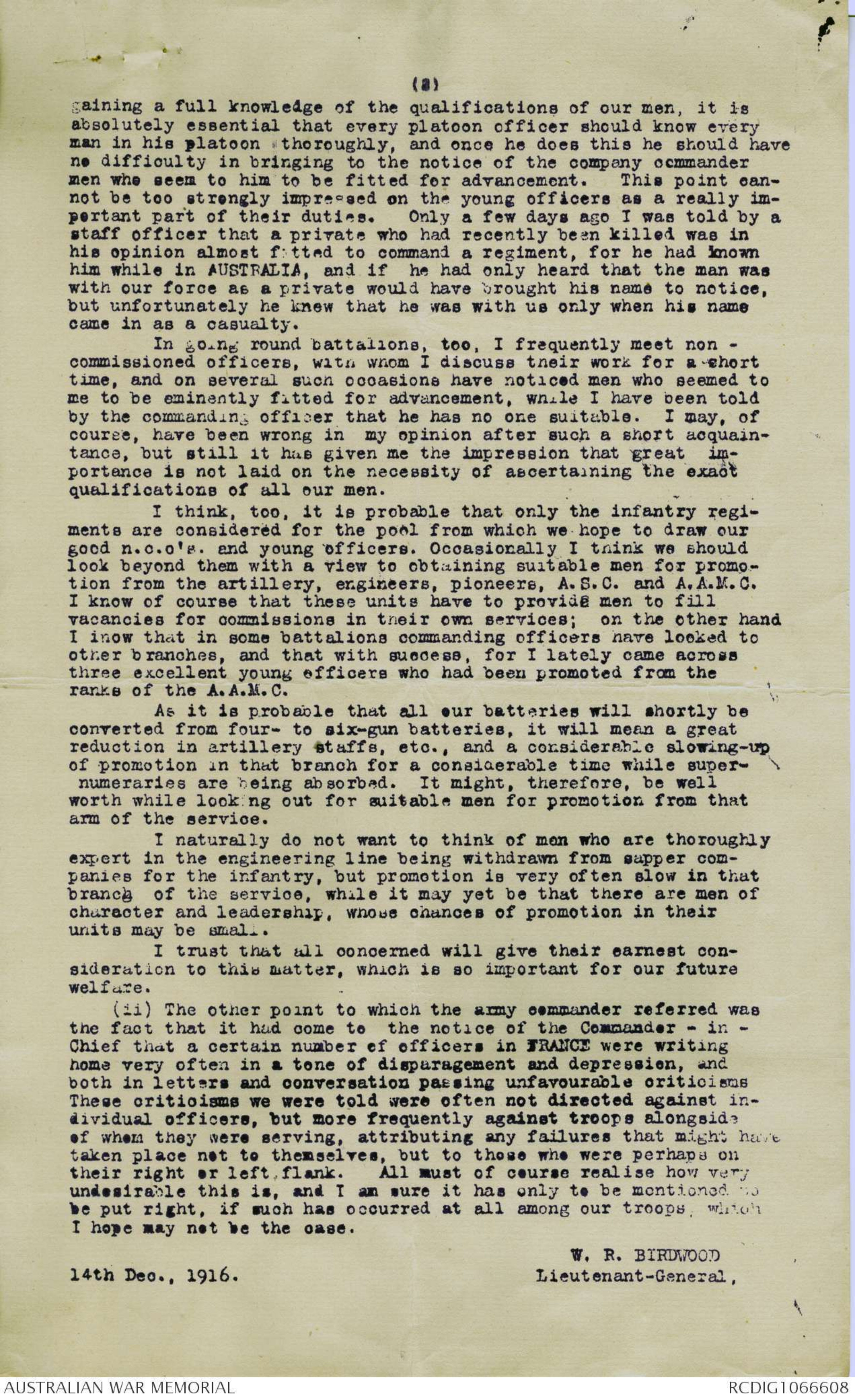
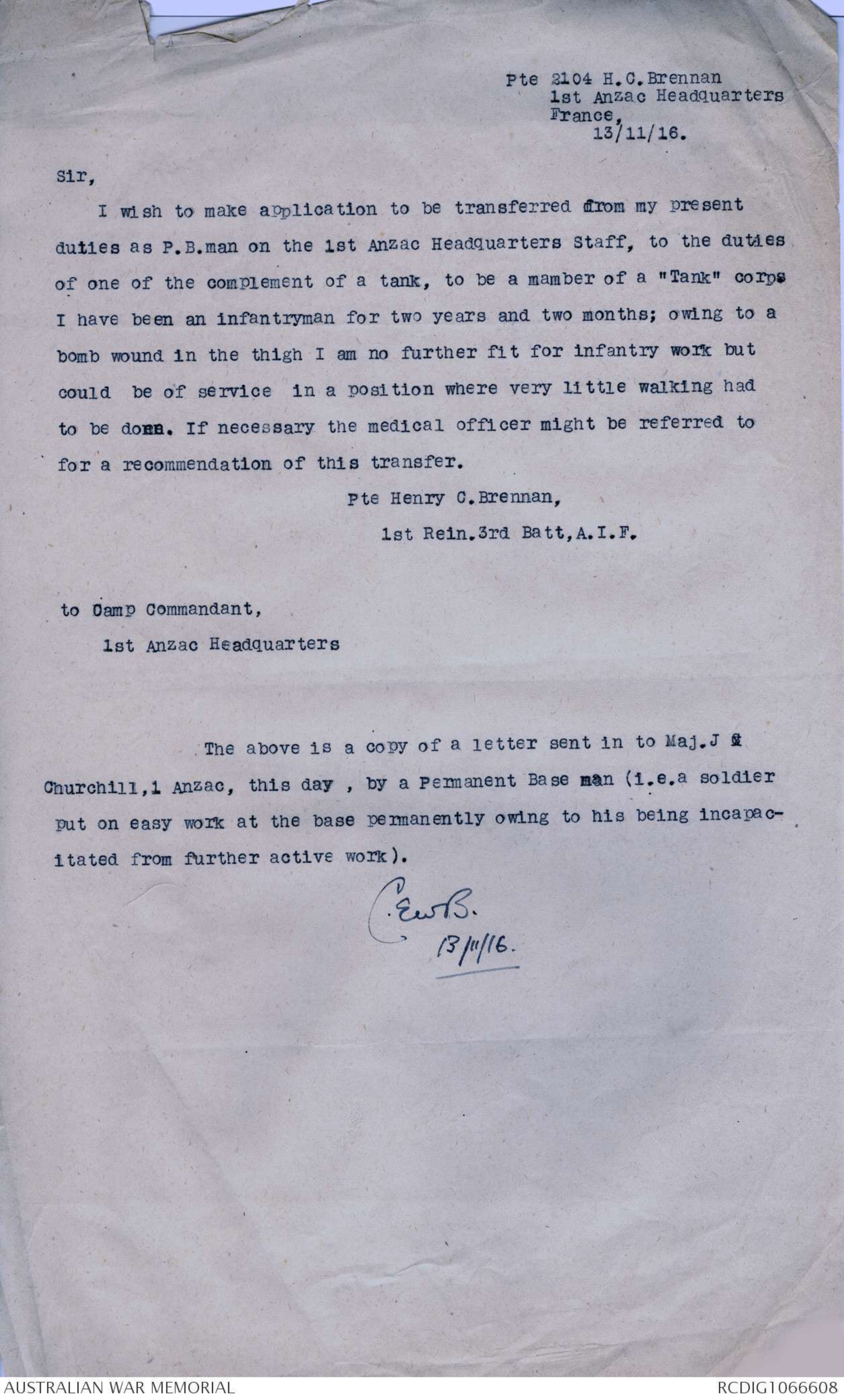
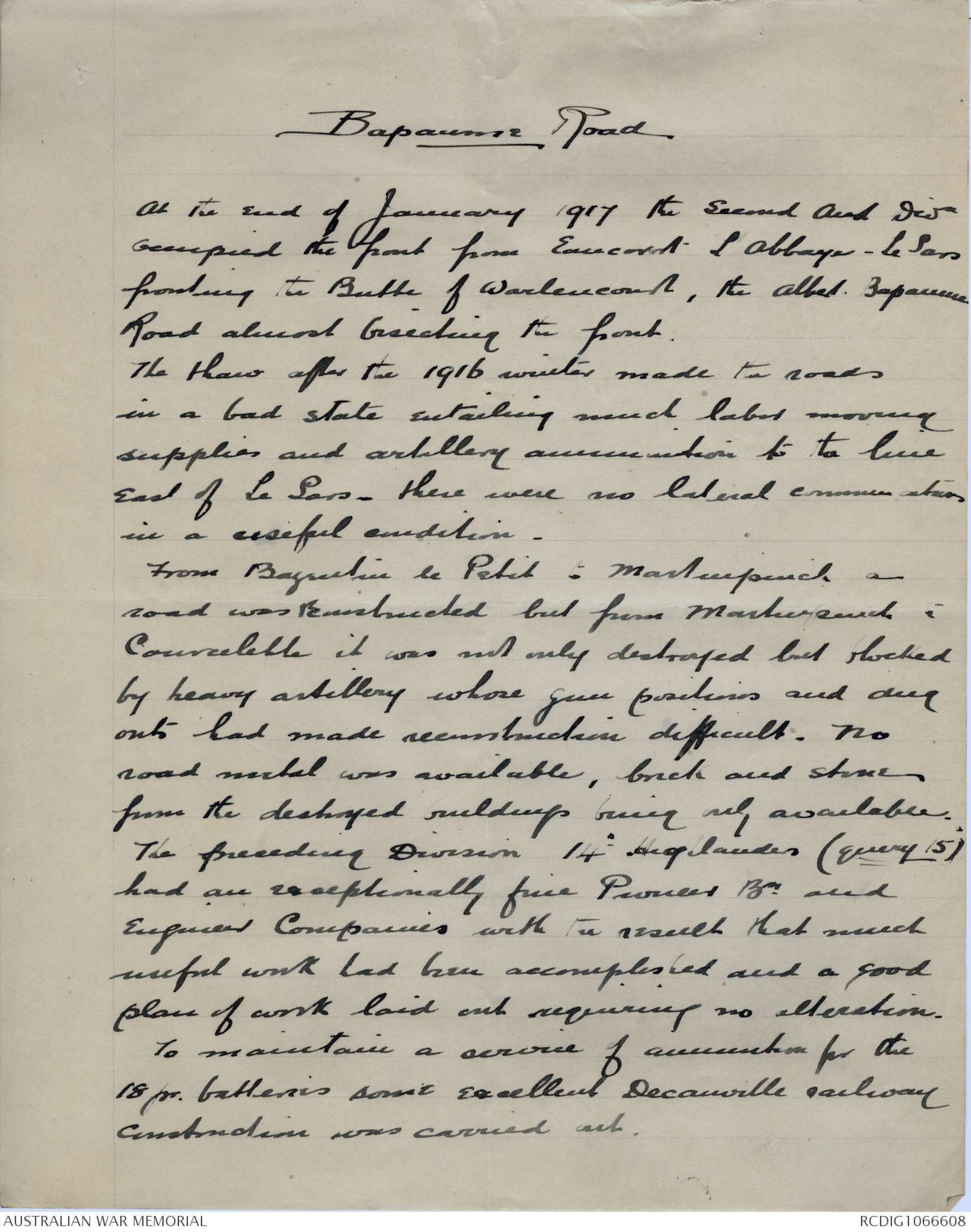
Glasfurd was the one General Staff Officer
whom he chose who was not an Australian.
Glasfurd was very loyal to his service.
He had devoted his whole self to the First
Division. His personal safety never entered
his mind where there was work to be done
for it. And he laid down his life in reconnoitring
for his Brigade. An Australian
General told me, "Of all the men I have
ever served with, he was the most whole-hearted
in his devotion to duty. I have
never known him to criticise an order, and
all the time I was with him I never knew
him to think of himself when any duty lay
before him."
Printed by R. & R. CLARK, LIMITED, Edinburgh.
GLP/AJF. VR/1072/A
Branch Office, No 5 Area,
IMPERIAL WAR GRAVES COMMISSION,
ALBERT
C. E. W. Bean Esq.,
Official Historian,
Victoria Barracks,
Melbourne,
VICTORIA. Australia.
Dear Mr. Bean,
Further to my previous correspondence, I
have just obtained information to the effect that a Member
of the 10th Bn.A.I.F. now buried in A.I.F. Cemetery, Grass
Lane, Guedecourt, was found at map reference 57D. X5B. 11.
These remains refer to Sgt .J.A. McKechnie,
10th Bn.A.I.F.
I trust that both you and Mrs.Bean are
enjoying the best of health and that you yourself have
fully recovered from your operation whilst in England.
Please accept my best wishes,
Yours very sincerely,
GL. Phillips
Area Superintendent,
No 5 Area, I.W.G.C.,
ALBERT
7. 9. 1926.
[*Somme Winter 1916/1917*]
Extracts from "The Scots Guards in the Great War 1914-1918."
by F. Loraine Petre, O.B.E., Wilfrid Ewart, and Major-General
Sir Cecil Lowther, K.C.M.G., C.B., C.V.O., D.S.O. (John Murray, 1925).
P.P. 172/173:-
"The winter of 1916 on the Somme front was characterized
by very bad weather, rain, snow, frost, and thaw alternating.
It is true that a great part of this area was undulating, and
that drainage of the higher land was very much easier than in
the water-logged parts of Flanders, but in the Somme area the
mud was of a peculiar consistency and depth, and in the low-lying
valleys conditions were not so very much better than in
Flanders. The surface of the country was everywhere pitted
by ^the shells of both sides in the fighting which had extended
over the months succeeding the 1st. July.
Roads and other landmarks had been obliterated, and
it was difficult to find the way over the shell-torn surface
which intervened between the rear and the front lines.
The distances were often long, and there were few communication
trenches available. Sometimes it happened that part of a
battalion, or even of a company, might find itself on a slope
in comparative comfort in deep, well-drained trenches, whilst
the rest, down in the valley, were little better off than they
would have been near Givenchy or Ypres. There were cases where
men literally had to be dug out of the clinging, chalky mud
in which they had got embedded, and the consequences of
straying into a shell-hole or crater might be fatal. All this
had to be remedied as far as possible by the troops in occupation,
and they were kept more than busy with fatigues. Even the rest
camps, when reached, were often far from the pleasant relief which
their name promised, and, as in the case of camp "F", were often
muddy areas in which the huts were built, or perhaps only tents
were to be found. The whole of December was spent under
these unpleasant circumstances, to the accompaniment of
frequent hostile bombardments, which, however, were not followed
by infantry activity, which was practically precluded by the
conditions of weather and ground on both sides. Casualties were
generally small, and what there were were almost entirely
caused by artillery fire.
The 2nd Battalion had obtained permission from the
Brigadier to wear patches of red, blue, and white dicing, like
that worn in peace time on the forage caps of the Scots Guards,
and it is noted in the battalion diary of the 8th December,
that officers and warrant officers started wearing it on their
steel helmets. Christmas Day saw the 2nd Battalion in
trenches. They had fraternized freely with the enemy on the
first, and to a certain extent on the second, Christmas Day of
the War. On this third Christmas Day there were no demonstrations
of friendliness on either side. On the contrary, there was a
smart bombardment of the German trenches by the British
artillery, the reply to which resulted in the death of two men
of the 2nd Scots Guards.
P.P. 174/175:-
"So far the 1st Battalion had been busy trying to
improve their trenches, and there was no advantage in stirring up
the wasps' nest in the opposing German trenches, or drawing
fire which would hamper the working parties. The necessity
for quiet had ceased by the 18th January when, with a chivalry or
a sense of humour which was equally wanting on the German side,
Headquarters of the 2nd Guards Brigade thought fit to give notice
that there would be an end to the temporary informal truce from
rifle fire on the British side. A notice was drawn up
"Warning! all Germans exposing themselves after day-light to-morrow,
January 19th, will be shot." The notice was duly served by the
1st Scots Guards outside the German wire on a German officer,
to whom it was translated, and who promised to communicate it to
his neighbourhood. The circumstances of the delivery of the
notice suffice to show that there really had been some sort of
tacit understanding about not shooting.1"
1. This incident is not recorded in the war diary of the
1st Scots Guards.
X X X X X X X
P.P. 181/2.-
"As Wellington in 1810 fell back before Massena on the
lines of Torres Vedras, so now the Germans were deliberately
falling back to the great defensive position of the Hindenburg
line, which they had prepared with infinite skill and care inthe rear. Thence they hoped to issue in due course as
Wellington issued from Torres Vedras. Again, as Wellington
in his retreat to Torres Vedras had done his best to clear
the country he was leaving of all supplies and conveniences
for the enemy, so the Germans now endeavoured to hamper the
advance of the British and to render the new to country into
which they were marching as inhospitable and difficult as
possible. But they were more ruthless than Wellington, and
had better means at their command. As they fell back, the
whole country-side was devastated, the villages burnt, the
bridges blown up, trees felled across the roads, and the roads
themselves, as well as railways, rendered temporarily impassable
by the explosion of mines, which left everywhere great craters
fatal to all traffic. The difference between them and
Wellington was that the latter, retiring through an allied
country, was bound to show what consideration was possible to
its inhabitants, and to rely largely, and often in vain, on
their devotion to the common cause in sacrificing their own
immediate personal interests. The Germans, on the other hand,
were in a hostile and hated country; towards whose inhabitants
they need not, and did not, show the slightest consideration,
and whom they were prepared to remove wholesale to other
parts.
For the British, as they went forward, it was absolutely
necessary to build up and repair the ruined communications with
their rear. This entailed road and railway repairs, clearing
of obstructions, and of the "booby traps" and delayed-action
mines, in the setting of which the Germans displayed a
fiendish ingenuity."
X X X X X X X X
Col. A. G. Butler in Somme Winter:-
Butler was then D.A.D.M.S. at Corps. When trench feet
became so bad in the Somme winter Col. Butler left Heilly (the
comfortable Corps H.Q.) and went up to live in the forward area
on the Somme front for a week in order to find out what the
conditions and discomforts really were and how they could be
put right.
HEADQUARTERS,
1st ANZAC CORPS.
11th NOVEMBER 1916.
Special Memo.
Confidential——For Officers Only.
Now that we all realise that we have before us a most strenuous and difficult time, which will require
the whole of our energy to weather with success, I wish to appeal to all officers of the A.I.F. to redouble their
efforts on behalf of their men. I am quite sure that every officer fully realises how absolutely essential it is
for him to keep before himself both day and night the one thought for the well-being of his men.
We have now been a regular Australian force long enough for every officer to realise that it is up to him
and that his personal honour is involved, to put all thoughts for himself—his comfort and well-being, far in
the back-ground, and to determine that his thoughts and efforts should always be to look after his men, first
and foremost, and to sacrifice himself completely.
I know that all the senior officers have no thoughts but these, but I feel it is just as well to impress
them on those who are still quite junior, and I therefore especially appeal to the company and platoon commanders,
for they, after all, are the real backbone of an army, and on them to a very great extent victory
must depend. We must all realise, too, that we cannot hope for victory unless we keep our men well fed,
well clothed, fit, and cheery.
I doubt if any army has ever had to meet a harder time than that now before us, with conditions of
weather and country to be fought just as determinedly as we have to fight the Germans.
As an example of what I have in mind in appealing to you now, I may mention that only today I happened
to be visiting our forward support line, and saw a battalion which had just come in after being three
days in the trenches. The men were naturally absolutely dog-tired and thoroughly wornout, and I am sorry
to say a great many were suffering from "trench feet"—some of them very severely too. It was a beautiful
sunny day, and I should like to have seen full advantage taken of this in doing what was possible to ease the
men, when no comforts were obtainable locally. I should like to have seen company and platoon commanders
going round immediately the battalion had reached its halting place, seeing that every man had taken off
his putties, boots and socks, (drying them in the sun,) and loosened his breeches at the knees. This alone
would have caused immediate circulation, while the men might also have been employed rubbing their feet.
In a few instances this was done but in a great many cases I noticed the men all sitting about, no one having
taken the trouble to see that they were receiving proper attention.
I fully realise the tremendous difficulty there is on such occasions in getting up anything like hot tea
and hot food; but I always feel that, if really determined efforts are made by officers, these will be procured
when the distance to the rear is not enormous.
The same applies, to some extent in the advanced trenches. I well know how extremely difficult it is
to provide warm food or covering of any sort for the men, but there again I feel sure, if every officer makes
up his mind that he will overcome all the difficulties to save his men, that it will be done; and I know there
is not an officer who could ask for a greater reward in succeeding, than that of seeing his men comfortable.
In saying this I am sure you will all realise that I am not in any way merely finding fault, for that is
far from being my intention. I do fully realise the diffiiculties, for I have myself been floundering through
the mud for the last week visiting all the points which I could possibly reach, and I know what an overwhelming
feeling of the impossible comes over one, when one realises all that has to be done. Still we have
to do it, and I know well we will do it but only with the help of every officer in the Force, and that I
know I can rely on with complete confidence.
W. R. BIRDWOOD.
Anzac Press - MMM - 11.16
CONFIDENTIAL
I ANZAC Corps.
At a meeting of corps commanders held two days ago at Army
headquarters, the army commander asked that certain points in connection
with officers generally throughout the forces in France
should be especially brought to notice of divisional-generals and
those under them.
(i) It was pointed out that throughout the whole army we are
undoubtedly in a very different position from what we were two
years ago, and of course the same applies, possibly to a greater
extent, to the Germans. When we started the war, we had a large
number of thoroughly trained professional officers. Of these a
very large number has disappeared, and to a great extent had to be
replaced by men who previously knew nothing of soldiering. All
units are more or less in the same state, so that it is quite
impossible for us ever to look to the old regular army to provide
officers, and we must therefore realise that we must be self-supporting.
Indeed, in this respect I cannot help thinking that
we are probably much better off than a great many others, as we
have in the A.I.F. such a large number of young men who have
had a much wider experience than many of the boys who have joined
the New Army in ENGLAND. We have enlisted men of intelligence,
initiative and resource, and it therefore behoves us to make full
and ample use of these, and to satisfy ourselves that our resources
in this respect are not allowed to lie fallow.
When we come to further heavy fighting, we must again
expect heavy losses among officers, and it is to made good these
that we have now to look well ahead.
The army commander therefore laid great stress upon the
necessity for a thorough training in our divisional schools,
while we have the opportunity, of all young officers, non-commissioned
officers, and aspirants to those posts, as platoon
officers and platoon sergeants. The Commander-in Chief has
said that this is a platoon officers' war, and, this being the
case, it behoves us to se that no steps are neglected to
ensure the selection of our best men for appointment as platoon
officers.
While seeing different battalions as I do, I am often
told by some commanding officers that they have excellent young
officers and non-commissioned officers, and still a number of
men in the ranks who they have reason to suppose will train on
satisfactorily in time to replace casualties. In other battalions
I am told that they are absolutely at their last gasp
in this respect - that every eligible man has been promoted,
and that they have not even one man left in the ranks who is
fitted for promotion to sergeant. It may well be the case
that among older men in the ranks there are none left who are
suitable for promotion, as they will be those remaining after
sifting out time after time the fit men to replace casualties
incurred in our various engagements.
If this is the case, it must not be overlooked that
among reinforcements there must be a certain number of men
whom it will be well worth while taking in hand with a view to
their improvement and fitting them for promotion. I am aware
that in some battalions there is a dislike to promoting a
private of reinforcements (who possibly came out from AUSTRALIA
as a temporary sergeant, and who has had to revert on joining
us) over the heads of the old soldiers. If it is thought that
such a man would not be suitable as an officer in his own
battalion, his na e should at once be noted, and given to the
brigadier, with a view to his possible promotion in another
battalion of the same or probably a different brigade.
To make sure, however, that we do not miss a chance of
(2)
gaining a full knowledge of the qualifications of our men, it is
absolutely essential that every platoon officer should know every
man in his platoon thoroughly, and once he does this he should have
no difficulty in bringing to the notice of the company commander
men who seem to him to be fitted for advancement. This point cannot
be too strongly impressed on the young officers as a really important
part of their duties. Only a few days ago I was told by a
staff officer that a private who had recently been killed was in
his opinion almost fitted to command a regiment, for he had known
him while in AUSTRALIA, and if he had only heard that the man was
with our force as a private would have brought his name to notice,
but unfortunately he knew that he was with us only when his name
came in as a casualty.
In going round battalions, too, I frequently meet non-commissioned
officers, with whom I discuss their work for a short
time, and on several such occasions have noticed men who seemed to
me to be eminently fitted for advancement, while I have been told
by the commanding officer that he has no one suitable. I may, of
course, have been wrong in my opinion after such a short acquaintance,
but still it has given me the impression that great importance
is not laid on the necessity of ascertaining the exact
qualifications of all our men.
I think, too, it is probable that only the infantry regiments
are considered for the pool from which we hope to draw our
good n.c.o's. and young officers. Occasionally I think we should
look beyond them with a view to obtaining suitable men for promotion
from the artillery, engineers, pioneers, A.S.C. and A.A.M.C.
I know of course that these units have to provide men to fill
vacancies for commissions in their own services; on the other hand
I inow that in some battalions commanding officers have looked to
other branches, and that with success, for I lately came across
three excellent young officers who had been promoted from the
ranks of the A.A.M.C.
As it is probable that all our batteries will shortly be
converted from four- to six-gun batteries, it will mean a great
reduction in artillery staffs, etc., and a considerable slowing-up
of promotion in that branch for a considerable time while supernumeraries
are being absorbed. It might, therefore, be well
worth while looking out for suitable men for promotion from that
arm of the service.
I naturally do not want to think of man who are thoroughly
expert in the engineering line being withdrawn from sapper companies
for the infantry, but promotion is very often slow in that
branch of the service, while it may yet be that there are men of
character and leadership, whose chances of promotion in their
units may be small.
I trust that all concerned will give their earnest consideration
to this matter, which is so important for our future
welfare.
(ii) The other point to which the army commander referred was
the fact that it had come to the notice of the Commander-in-Chief
that a certain number of officers in FRANCE were writing
home very often in a tone of disparagement and depression, and
both in letters and conversation passing unfavourable criticisms
These criticisms we were told were often not directed against individual
officers, but more frequently against troops alongside
of whom they were serving, attributing any failures that might have
taken place not to themselves, but to those who were perhaps on
their right or left, flank. All must of course realise how very
undesirable this is, and I am sure it has only to be mentioned to
be put right, if such has occurred at all among our troops, which
I hope may not be the case.
W. R. BIRDWOOD
14th Dec., 1916. Lieutenant-General,
Pte 2104 H.C. Brennan
1st Anzac Headquarters
France,
13/11/16.
Sir,
I wish to make application to be transferred from my present
duties as P.B.man on the 1st Anzac Headquarters Staff, to the duties
of one of the complement of a tank, to be a mamber of a "Tank" corps
I have been an infantryman for two years and two months; owing to a
bomb wound in the thigh I am no further fit for infantry work but
could be of service in a position where very little walking had
to be done. If necessary the medical officer might be referred to
for a recommendation of this transfer.
Pte Henry C. Brennan,
1st Rein.3rd Batt, A.I.F.
to Camp Commandant,
1st Anzac Headquarters
The above is a copy of a letter sent in to Maj. J x
Churchill, 1 Anzac, this day, by a Permanent Base man (i.e. a soldier
put on easy work at the base permanently owing to his being incapacitated from further active work).
CEWB.
13/11/16
Bapaume Road
At the end of January 1917 the Second Aust Divn
occupied the front from Eaucourt L Abbaye - Le Sars
fronting to Butte of Warlencourt, the Albert Bapaume
Road almost bisecting the front.
The thaw after the 1916 winter made the roads
in a bad state entailing much labor moving
supplies and artillery ammunition to the line
East of Le Sars - there were no lateral communications in
in a useful condition.
From Bagnelin le Petit - Martinpuich a
road was renstructed but from Martinpuich a
Courcelette it was not only destroyed but blocked
by heavy artillery whose gun positions and dug
outs had made reconstruction difficult. No
road metal was available, brick and stones
from the destroyed buildings being only available.
The preceding Division 14 Highlanders (query 15)
had an exceptionally fine Pioneer Bn and
Engineer Companies with the result that much
useful work had been accomplished and a good
plan of work laid out requiring no alteration.
To maintain a service of ammunition for the
18th. batteries some excellent Decauville railway
construction was carried out.
 Deb Parkinson
Deb ParkinsonThis transcription item is now locked to you for editing. To release the lock either Save your changes or Cancel.
This lock will be automatically released after 60 minutes of inactivity.